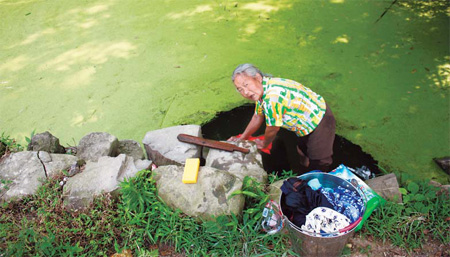China
Rural water safety threatened
By Wang Qian (China Daily)
Updated: 2010-10-21 07:49
 |
Large Medium Small |
|
A woman from an unnamed village in Chongqing washes clothes on July 29 in a pool that has been taken over by duckweed. Chen Xiaohua / for China Daily |
BEIJING - The poor quality of natural water resources and devastating pollution threaten the safety of drinking water for millions of inhabitants across vast areas of rural China, a report warned on Wednesday.
The report, released by the Ministry of Water Resources and the World Wide Fund for Nature (WWF), addresses the need to supervise the safety of water resources in rural China.
Most of China's water resources in rural areas naturally contain excessive levels of heavy metals, such as arsenic, fluoride and iron, as well as some radioactive elements, according to the report.
Rural water pollution, the result of rising incidents of industrial pollution, outdated sewage systems, and the overuse of pesticides and chemical fertilizers, also endangers the health of rural inhabitants in China, it said.
Industrial pollution is responsible for depositing heavy metals and nitrates in rural water supplies, contributing to eutrophication, a process in which excessive nutrients stimulate abundant plant growth that depletes the oxygen supply for other aquatic life.
"It is a challenge for us to be able to guarantee the safety of rural drinking water, especially when industrial pollution is moving from cities to the countryside and we lack a comprehensive rural sewage treatment system," said Ni Wenjin, deputy director of the department of rural water resources under the ministry and a co-author of the report.
More than 320 million people living in rural areas drank unhealthy water in 2005, according to the report. For 70 percent of them the water was naturally of poor quality, while the other 30 percent drank water that had been polluted.
"So far, more than 33 percent of the country's lakes and rivers have been polluted, with more than 55 percent of the ecosystems in these lakes and rivers having been damaged by pollution, resulting in eutrophication," Zhu Chunquan, WWF China's conservation director, said at a press conference announcing the report.
Among recent incidents of water pollution in rural China, in July the Zijinshan Copper Mine, which is owned by the Zijin Mining Group, leaked sewage containing heavy metals into the Tingjiang River in Fujian province, polluting the river and killing slews of fish.
The water supply of villagers living along the river was also affected in the incident.
In August 2009, 1,300 children tested positive for high levels of lead in their blood and 1,000 people were relocated as a result of pollution from the Dongling Smelter Co Ltd in Fengxiang county, Northwest China's Shaanxi province.
In July 2009 more than 500 villagers became ill and two died after being exposed to cadmium, a heavy metal pollutant discharged into the Liuyang River and surrounding land by the Xianghe Chemical Plant in Liuyang city in Central Chinas' Hunan province.
From 2006 to 2010, a total of 22 billion yuan ($3.2 billion) was invested in ensuring the safety of drinking water in rural areas, improving the water quality for 220 million more rural inhabitants, Ni said.
China plans to provide safe drinking water for all those in rural areas before 2013, he added.
Jin Haixing contributed to this story.
